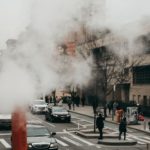 The concept of “environmental justice,” originating from the United States in the 1970s, questions whether everyone is equally affected by environmental pollution. It revolves around the idea of ensuring fairness and equity in environmental matters, aiming to prevent certain groups or regions from bearing a disproportionate burden of environmental problems.
The concept of “environmental justice,” originating from the United States in the 1970s, questions whether everyone is equally affected by environmental pollution. It revolves around the idea of ensuring fairness and equity in environmental matters, aiming to prevent certain groups or regions from bearing a disproportionate burden of environmental problems.
While the U.S. has made strides in reducing air pollution through strict regulations, attention has shifted towards addressing social disparities in air quality. However, there’s a gap in environmental justice research in Korea.
Environmental justice
A study by Pohang University of Science and Technology (POSTECH), in collaboration with the California Air Resources Board, explores the impact of COVID-19 lockdown policies on air pollution in the U.S.
The study aimed to understand how these policies affected social inequalities in air pollution exposure and provide insights for crafting fair environmental policies.
Nitrogen dioxide (NO2), a key indicator of combustion-related air pollution, was examined to gauge the effects of lockdown policies on social disparities.
Results showed a significant drop in average NO2 levels in California post-lockdown, with non-urban areas seeing a 17% decrease and urban areas experiencing a 50% reduction due to decreased traffic.
Social inequity
Moreover, the study analyzed shifts in social inequity related to air pollution, focusing on vulnerable groups based on education level and race/ethnicity. The reduction in disparity from 79% to 37% was attributed to disadvantaged communities residing in areas with higher emissions, particularly from vehicles like diesel trucks.
Lockdown policies not only lowered overall air pollution but also decreased social inequities linked to it. This suggests the potential of policies targeting emissions from combustion engines to reduce both pollution levels and disparities in exposure.
The study emphasizes the need to learn from California’s experiences for future air pollution policies. While the reduction in social disparities during lockdown may be temporary, sustained efforts targeting specific pollution sources can lead to lasting improvements in equity. This necessitates a nationwide examination of social inequities in exposure to each pollutant and concerted action to address their sources.
“Currently, Korea is primarily focused on lowering the average air pollution levels,” the authors conclude. “However, the simultaneous reductions of average air pollution levels and social inequities of air pollution are achievable. This can be accomplished by developing policies that incorporate environmental justice principles.”